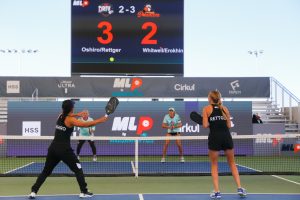- Slug: Sports-Arizona Deaf Pickleball, 600 words.
- Photo available (thumbnail, caption below).
- Video available.
By Addison Kalmbach
Cronkite News
PHOENIX – The squeaking of shoes. The collision of ball and paddle. The banter of opponents.
These sounds often associated with pickleball are not part of the experience for a growing segment of the sport: the deaf community.
“Those things don’t matter,” said Sandra Price, a deaf pickleball player who competes in a Scottsdale recreational league. “I still experience the camaraderie, and it fulfills my competitive needs.”
A game that combines elements of tennis, ping pong and badminton is one of the fastest-growing sports in the country and has seen a 159% jump in participation in just three years, according to a study by the Sports and Fitness Industry. Approximately nine million people play the sport, which is increasingly attracting a diverse group of people.
Professional pickleball players Franciso German and Shawn Benavente have a love for the game and a love for tying communities together.
Both are deaf and in January 2021, created the Arizona Deaf Pickleball League to merge both the deaf and hearing communities together through the sport.
Now with over 400 members, the goal of tying both communities together has inspired German and Benavente to continue.
“Our mission is to educate hearing and deaf people to play together, teaching players how to score one through 10,” German said. “We met most of the hearing players through the park and tournaments.”
Educating others about American Sign Language (ASL) also drives both men.
“They were very eager to learn ASL numbers,” German said. “We’re very inclusive and we don’t exclude anyone as long as they learn ASL.”
Learning to sign numbers is a basic foundation of the language and is often picked up quickly by the members of the league.
German even believes that keeping the score of matches is trending in the direction of adopting the ASL counting gestures.
“Deaf players can’t understand and that’s when we were like ‘no, no, no, huddle,’ and they can read lips and understand break, but nowadays they use it,” German said. “In baseball, they use ball and strike before they’re just shouting. They had a deaf baseball player that taught the umpire, ‘no do ball, strike’ so they know the universal signal.”
Both German and Benavente are sponsored by Armour Pickleball, a Peoria-based pickleball company.
Sheldon Lessard, the company’s president, invited German and Benavente to Gilbert Regional Park to discuss business. Until then, Lessard knew little about the deaf community..
“They taught us how to sign the score and we taught them a little about pickleball,” Lessard said. “(I) fell in love with those two gentlemen and that night I invited both into being sponsored athletes for Armour Pickleball.”
The positive effects of pickleball include exercise, teamwork and improved social skills. However, Benavente believes the sport offers so much more.
“It’s also good for your mind and your body,” he said. “You can play with different people, old or young. Pickleball is for everybody.”
The league continues to grow and its members continue to practice ASL. In fact, a quarter of its members have learned signing since joining the league.
Inclusivity is a priority for many leagues, which has contributed to the rapid growth of the sport.
Positive vibes and a healthy culture have allowed German and Benavente to create a league where everyone is welcome and learns from each other, including life skills such as ASL.
“I want to work with this group because I want deaf people to come together,” Benavente said. “I want to see improvement in pickleball where deaf people play with hearing people.
“I want to see more deaf people involved.”
For more stories from Cronkite News, visit cronkitenews.azpbs.org.
